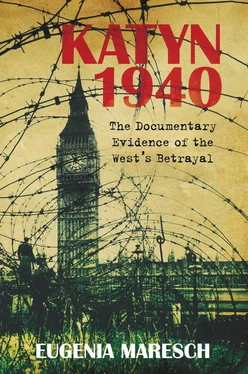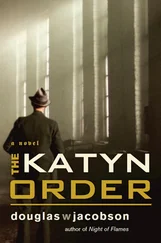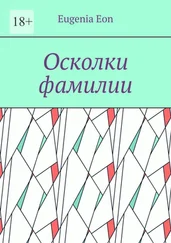3. While staying in various camps and GULag posts north of Kniazpogost between March and April 1942, I have seen small groups of soldiers in uniform near a railway station at Josser but the guards did not allow us to make contact. By the style of some uniforms, I gather there must have been some Poles amongst the officers and men marching to work; another guard has confirmed it. At a place called Ropcha, 8 kilometres north of Josser station, there was a hospital belonging to Sievzeldorlag district, where sick people from the camps were sent. There was a cemetery with Polish graves nearby, showing clearly the names and ranks of the dead. This particular PoW camp was closed down in the summer of 1941.
4. In February 1942, at the 14 Ustvim GULag while in hospital, I was told by another Russian that in the summer of 1940, he was doing hard labour in the region of Murmansk and saw large movements of Polish soldiers. I was told the life in these camps was exceptionally hard and by observations it can be assumed that they were Polish officers.
Stanisław Swianiewicz
[29] Translation by EM.
Kuibyshev, 28 May 1942
From 11 April 1943, the German radio service ‘Trans-ocean’ started to broadcast the discovery of Polish mass graves in the Katyn woods, near Smolensk. Although suspected, but never consciously accepted by the Polish people, it was devastating news, which actually reached a world audience on 13 April 1943 on the German Home Service. The Confidential Annex of the War Cabinet meeting held on 13 April did not record the shocking news, but concentrated on Eden’s report of his meeting with President Roosevelt, who had asked him if Russia wanted to communise all Europe after the war. To which Eden replied that he did not think so, but ‘one of the best ways of avoiding this was to keep on good terms with Russia’. Roosevelt was decisive about the prolonged wrangle on the subject of the Curzon Line. He assumed that if Poland took over Eastern Prussia and Silesia, she ought to be satisfied and accept the Line as the boundary with Russia:
Let the United States and Russia settle between themselves what they regard as fair terms and then with the help of the British, try to persuade the Poles to accept the settlement. [1] TNA CAB 65/34, minutes of the War Cabinet meeting, confidential Annex, 13 April 1943.
On 15 April, Prime Minister Winston Churchill invited General Władysław Sikorski, together with Ambassador Edward Raczyński, [2] Edward Raczyński (1891–1993) Polish diplomat, representative at the League of Nations 1932–1934, Ambassador to Britain 1934–1945, acting Foreign Minister 1940–1943. Prominent émigré politician in London.
to lunch; also present were Eden and Cadogan. The main purpose of the meeting was to discuss the newly proposed boundaries. It was also an occasion for Churchill to raise the subject of Katyn. He warned the Poles not to be drawn by the German provocation. On 19 April the War Cabinet discussed the Katyn massacre, with an attempt by Eden ‘to persuade the Poles to treat this as a German propaganda designed to sow discord between the Allies’.
Apparently Lieutenant General Marian Kukiel, [3] Marian Kukiel (1885–1973) General, politician and military historian; veteran of the Polish Legions and the Polish-Soviet war 1919–1920. Between the wars Professor at the Jagiellonian University. Joined the Sikorski government as Minister of Defence.
Minister of Defence of the Polish government, issued a long communiqué directly to the press, ending with a statement that the Polish government would be approaching the International Red Cross to take charge of the Katyn investigation. The same day, during lunch given by Eden to the Foreign Ministers of the Allied countries, Raczyński in passing mentioned that a reply was to be made regarding the accusations, to which Eden and Cadogan expressed the view that the reply should throw doubt on the German story. Roberts confirms this in his hand-written note – ‘The Poles did I believe mention the matter casually at lunch, but this could hardly be described as consultation.’ [4] TNA FO 371/34577 C 5947, hand-written note by Frank Roberts with minutes by Alexander Cadogan and Anthony Eden regarding suggestions as to how to avoid an embarrassing reply in Parliament.
The subject was raised again in Parliament. Viscount Cranborne speaking for the Government stated that the Polish government took this decision without communicating beforehand with Owen O’Malley, [5] Owen St Clair O’Malley (1887–1974) Entered Diplomatic Service in 1911, served in China 1925 and Yugoslavia; FO between 1933–1937, Minister Plenipotentiary to Mexico 1937–1938, British Embassy in Spain 1938–1939, Chargé d’Affaires in Budapest 1939–1941; Ambassador to the Polish government in exile in London 1941–1945, knighted 1943; after the war Ambassador to Portugal 1945–1947, retired in 1947; published historical articles and autobiography The Phantom Caravan , 1954.
the British Ambassador to the Polish government-in-exile.
The Polish Council of Ministers met on 17 April to announce on the 19th that instructions had been sent to the PCK, Polski Czerwony Krzyż (Polish Red Cross) Delegate Stanisław Radziwiłł in Geneva asking the ICRC (International Committee of the Red Cross) to take charge of the investigation of the graves. Almost simultaneously, on 17 April, the Germans delivered a similar note to the ICRC. The Soviets interpreted this as collusion against them by the Poles and the Germans. On the same date, The Times of London published an article about the Katyn discovery and General Kukiel’s letter to the ICRC. Once the subject was in the public domain, Sikorski had to issue another statement quickly, condemning German hypocrisy as they were continually committing similar crimes against humanity.
Churchill signalled Stalin on 10 May 1943, full of apologies and assured him that the Polish press would be disciplined in the future. As regards the invitation to the ICRC, he stated that ‘the Poles did not tell us what they were going to do and so we could not warn them against the peril of the course which they proposed to take.’
The Polish Army in the East, by now training in Iraq, took the news badly. On 21 April, two days before Good Friday, a Requiem Mass was said for the dead officers as well as for those thousands who had perished from hunger, illness and those who had been killed as a result of the German invasion. After the Mass, General Anders, Commander of the Polish Army in the USSR spoke from his heart. [6] Polish Institute and Sikorski Museum (PISM) KOL 12/16d, signal No. 2592 from Baghdad to the Polish Ministry of Defence in London 14 IV 1943. Translation by EM.
No other Nation had to suffer tragedy like the Poles, who in 1939 took to arms in defence of their freedom. We were the only ones who in 1939 fought with the Germans, and for that, to receive a dagger in our backs from the Soviets. It took great responsibility, sacrifice and strength, which the nation had gathered throughout hundreds of generations, not to give in. That is why our nation still lives and fights without respite in foreign lands. Our huge sacrifice in this war, unknown to the rest of the world, cannot be counted as chivalrous combat, because a large number of victims were murdered or tortured to death or died from illness, hunger or the harsh climate. I feel that today, our brothers are with us in spirit. Soldiers! When you stand in readiness for war, remember to do your duty, because standing behind each of you are the souls of our departed. They are also Poles, whose duty falls onto you. I believe that justice will always prevail and our Polish cause, which is so righteous and fair, must triumph. I believe that our nation has always been and will be great if only for its sufferings and its hardened spirit. I know that with great effort we shall secure the Poland that we dreamed of, while we stayed in prisons and camps; our desire for vengeance at long last would be taken. This is why, today, while praying for our colleagues, brothers, sisters and children, who are no more – we pledge them, that we shall discharge this obligation on their behalf. In our long march to Poland, when we reach the borders, a signal will sound ‘Poles to arms!’ and people will come to us and those who have passed away will support us and induce us to greater deeds, for the glory and might of Poland.
Читать дальше












